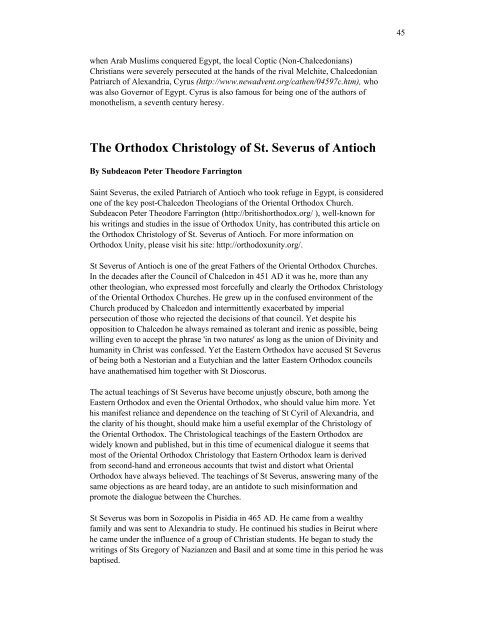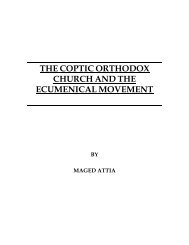Coptic interpretations of the Fourth Ecumenical Council - Saint Mina ...
Coptic interpretations of the Fourth Ecumenical Council - Saint Mina ...
Coptic interpretations of the Fourth Ecumenical Council - Saint Mina ...
You also want an ePaper? Increase the reach of your titles
YUMPU automatically turns print PDFs into web optimized ePapers that Google loves.
when Arab Muslims conquered Egypt, <strong>the</strong> local <strong>Coptic</strong> (Non-Chalcedonians)<br />
Christians were severely persecuted at <strong>the</strong> hands <strong>of</strong> <strong>the</strong> rival Melchite, Chalcedonian<br />
Patriarch <strong>of</strong> Alexandria, Cyrus (http://www.newadvent.org/ca<strong>the</strong>n/04597c.htm), who<br />
was also Governor <strong>of</strong> Egypt. Cyrus is also famous for being one <strong>of</strong> <strong>the</strong> authors <strong>of</strong><br />
mono<strong>the</strong>lism, a seventh century heresy.<br />
The Orthodox Christology <strong>of</strong> St. Severus <strong>of</strong> Antioch<br />
By Subdeacon Peter Theodore Farrington<br />
<strong>Saint</strong> Severus, <strong>the</strong> exiled Patriarch <strong>of</strong> Antioch who took refuge in Egypt, is considered<br />
one <strong>of</strong> <strong>the</strong> key post-Chalcedon Theologians <strong>of</strong> <strong>the</strong> Oriental Orthodox Church.<br />
Subdeacon Peter Theodore Farrington (http://britishorthodox.org/ ), well-known for<br />
his writings and studies in <strong>the</strong> issue <strong>of</strong> Orthodox Unity, has contributed this article on<br />
<strong>the</strong> Orthodox Christology <strong>of</strong> St. Severus <strong>of</strong> Antioch. For more information on<br />
Orthodox Unity, please visit his site: http://orthodoxunity.org/.<br />
St Severus <strong>of</strong> Antioch is one <strong>of</strong> <strong>the</strong> great Fa<strong>the</strong>rs <strong>of</strong> <strong>the</strong> Oriental Orthodox Churches.<br />
In <strong>the</strong> decades after <strong>the</strong> <strong>Council</strong> <strong>of</strong> Chalcedon in 451 AD it was he, more than any<br />
o<strong>the</strong>r <strong>the</strong>ologian, who expressed most forcefully and clearly <strong>the</strong> Orthodox Christology<br />
<strong>of</strong> <strong>the</strong> Oriental Orthodox Churches. He grew up in <strong>the</strong> confused environment <strong>of</strong> <strong>the</strong><br />
Church produced by Chalcedon and intermittently exacerbated by imperial<br />
persecution <strong>of</strong> those who rejected <strong>the</strong> decisions <strong>of</strong> that council. Yet despite his<br />
opposition to Chalcedon he always remained as tolerant and irenic as possible, being<br />
willing even to accept <strong>the</strong> phrase 'in two natures' as long as <strong>the</strong> union <strong>of</strong> Divinity and<br />
humanity in Christ was confessed. Yet <strong>the</strong> Eastern Orthodox have accused St Severus<br />
<strong>of</strong> being both a Nestorian and a Eutychian and <strong>the</strong> latter Eastern Orthodox councils<br />
have ana<strong>the</strong>matised him toge<strong>the</strong>r with St Dioscorus.<br />
The actual teachings <strong>of</strong> St Severus have become unjustly obscure, both among <strong>the</strong><br />
Eastern Orthodox and even <strong>the</strong> Oriental Orthodox, who should value him more. Yet<br />
his manifest reliance and dependence on <strong>the</strong> teaching <strong>of</strong> St Cyril <strong>of</strong> Alexandria, and<br />
<strong>the</strong> clarity <strong>of</strong> his thought, should make him a useful exemplar <strong>of</strong> <strong>the</strong> Christology <strong>of</strong><br />
<strong>the</strong> Oriental Orthodox. The Christological teachings <strong>of</strong> <strong>the</strong> Eastern Orthodox are<br />
widely known and published, but in this time <strong>of</strong> ecumenical dialogue it seems that<br />
most <strong>of</strong> <strong>the</strong> Oriental Orthodox Christology that Eastern Orthodox learn is derived<br />
from second-hand and erroneous accounts that twist and distort what Oriental<br />
Orthodox have always believed. The teachings <strong>of</strong> St Severus, answering many <strong>of</strong> <strong>the</strong><br />
same objections as are heard today, are an antidote to such misinformation and<br />
promote <strong>the</strong> dialogue between <strong>the</strong> Churches.<br />
St Severus was born in Sozopolis in Pisidia in 465 AD. He came from a wealthy<br />
family and was sent to Alexandria to study. He continued his studies in Beirut where<br />
he came under <strong>the</strong> influence <strong>of</strong> a group <strong>of</strong> Christian students. He began to study <strong>the</strong><br />
writings <strong>of</strong> Sts Gregory <strong>of</strong> Nazianzen and Basil and at some time in this period he was<br />
baptised.<br />
45








